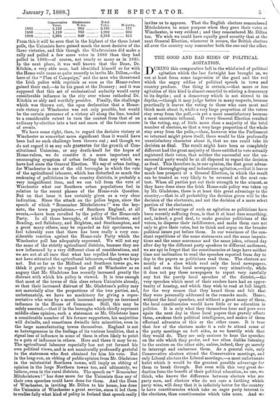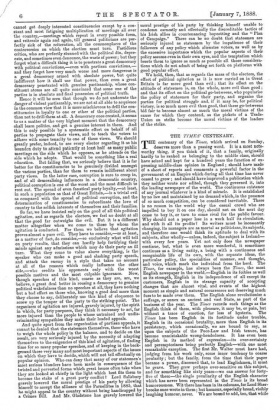THE GOOD AND BAD SIDES OF POLITICAL AGITATION.
DURING this comparative lull in the whirlwind of political agitation which the last fortnight has brought us, we can at least form some impression of the good and the evil which the angry eddies of political speech in town and country produce. One thing is certain,—that more or less agitation of this kind is almost essential to stirring a democracy. to its depths ; and a democracy which is not stirred to its depths,—though it may judge better in many respects, because practically it leaves the voting to those who care most and. think most about it, while a very large proportion of the voters- stay away from the poll,—is yet a most unsatisfactory because a most uncertain tribunal. If every General Election resulted. in the voting, say, of little more than a majority of the total number of electors, so that a very large proportion of the whole stay away from the polls,—then, however wise the Parliament so returned might prove itself, there would be this profoundly unsatisfactory character about it, that no one could take its- decision as final. The result might have been so completely different had the great majority of those entitled to vote actually registered their votes, that neither the successful nor the un- successful party would be at all disposed to regard the decision as final. This therefore is, in our opinion, the first great advan- tage of thoroughgoing and industrious agitation,—that it leaves much less prospect of a General Election, in which the result can be treated as very likely to be reversed at the next con- test. When all parties put out their strength to the utmost, as they have done since the Irish Home-rule policy was taken up by Mr. Gladstone, there is at least this great advantage to the country,—that in all probability the decision given will be the decision of the electorate, and not the decision of a mere select portion of the electorate.
The next advantage of such an agitation as politicians have been recently suffering from, is that it at least does something, and, indeed, a good deal, to make genuine politicians of the voters, to disperse their indifference, and make them care not only to give their votes, but to think and argue on the broader political issues put before them. In our weariness of the con- stant repetitions of the same statements and the same imputa- tions and the same scarcasms and the same jokes, uttered day after day by the different party speakers to different audiences, we are apt to forget that the constituencies at large have neither time nor inclination to read the speeches reported from day to day in the papers as politicians read them. The electors are mostly of a class which read only the local newspapers, and not even the local newspapers very attentively, while it does not pay these newspapers to report very carefully any but the purely local speeches of the district,—the very speeches which most of their readers have had an oppor- tunity of hearing, and which they wish to read at full length for the very reason that they heard them and felt that they were personally addressed in the remarks made. Hence, without the local speeches, and without a great many of them, the local constituencies would have little or no education in politics. It is only what they themselves hear and pore over again the next day in these local papers that gravely affects them, awakens their political intelligence, and makes of them effectual advocates of this or the other cause. It is true that few of the electors make it a rule to attend some of the party meetings on Loth sides, as we heartily wish that they would do. They are only anxious to hear the speeches on the side which they prefer, and too often dislike listening to the orators on the other side, unless, indeed, they go merely to interrupt and embarrass them. As a general rule, only Conservative electors attend the Conservative meetings, and only Liberal electors the Liberal meetings,—a most unfortunate habit which it would be the greatest possible advantage for them to break through. But even with this very great de- duction from the benefit of their political education, no one, we think, who knows the difference between electors who are party men, and electors who do not care a farthing which party wins, will deny that it is infinitely better for the country to have constituencies which take an eager party interest in the elections, than constituencies which take none. And we
cannot get deeply interested constituencies except by a con- stant and most fatiguing multiplication of meetings all over the country,—meetings which repeat in every possible form, and reiterate again and again, till general politicians are per- fectly eick of the reiteration, all the commonplaces of the controversies on which the election must turn. Fastidious critics, who are perfectly stunned with the political din, depre- cate, and sometimes even denounce, the waste of power; but they forget what a difficult thing it is to penetrate a great democracy with political convictions,—even with partisan convictions,— and they forget how very much worse and more dangerous is a great democracy armed with absolute power, but quite indifferent how it shall use that power, than even a great democracy penetrated with genuine partisanship, whose con- stituent atoms are all quite convinced that some one of the parties is in absolute and final possession of political truth.
Hence it will be seen that though we do not underrate the 'danger of violent partisanship, we are not at all able to acquiesce in the common view that it is more mischievous to drill the con- stituencies in loyalty to one or other of the political parties, than not to drill them at all. A democracy once created, it seems to us a matter of the very highest moment that the democracy shall learn politics, and get a genuine interest in them. And this is only possible by a systematic effort on behalf of all parties to propagate their views, and to teach the voters to- -adhere with some tenacity to one of these views. We should greatly prefer, indeed, to see every elector regarding it as his bounden duty to attend patiently at least half as many public meetings on the side which he opposes, as he attends on the side which he adopts. That would be something like a real education. But failing that, we seriously believe that it is far better for the constituencies to be genuinely divided amongst the various parties, than for them to remain indifferent about party views. In the latter case, corruption is sure to creep in, and of all demoralising influences in a democratic country, political corruption is one of the worst and the most difficult to root out. The spread of even fanatical party loyalty,—at least, in such a population as that of Great Britain,—is a trivial evil as compared with the spread of political corruption, and the determination of constituencies to subordinate the love of country to the selfish interests of themselves and their families.
So far, we have insisted only on the good of all this political agitation, and as regards the electors, we feel no doubt at all that the good far outweighs the evil. But it is a different matter altogether when we come to those by whom the agitation is conducted. For them we believe that agitation proves almost a pure evil. They have to consider,—or at least, as a matter of fact, do consider,—so exclusively what will tell on party results, that they can hardly help fortifying their minds against any admissions which may do their party an ill tarn. What they come to value above everything, is the speaker who can make a good and slashing party speech, and attack the enemy in a style that takes no account at all of the reasons which really influence the other side,—who credits his opponents only with the worst possible motives and the most culpable ignorance. Now, though speeches of this kind, coarse as they are, are, we believe, a great deal better in rousing a democracy to genuine political wakefulness than no speeches at all, they have nothing but a bad effect on those who, knowing a good deal more than they choose to say, deliberately use this kind of eloquence to screw up the temper of the party to the striking-point. The organisers of agitation are injured, gravely injured, by the spirit in which, for party purposes, they think it necessary to act, far
more injured than the people to whose untrained and undis-criminating sympathies they make their loaded appeals. And quite apart from the organisation of partisan appeals, it cannot be denied that the statesmen themselves, those who have to weigh the whole policy in the balance, and to decide on the result, are very seriously injured by the necessity of adapting themselves to the exigencies of this kind of agitation, of finding time for so many popular speeches, and of keeping in the back- ground those very many and most important aspects of the issues on which they have to decide, which will not tell effectually on popular opinion. Who can deny that many of our statesmen's most serious blunders have been made in consequence of the twisted and perverted forms which great issues often take when they are looked at chiefly in the light which best fits them to become the stake of a great party conflict? Lord Salisbury gravely lowered the moral prestige of his party by allowing himself to accept the alliance of the Parnellites in 1885, that he might appeal to the country without being handicapped by a Crimes Bill. And Mr. Gladstone has gravely lowered the
moral prestige of his party by thinking himself unable to condemn earnestly and effectually the discreditable tactics of his Irish allies in countenancing boycotting and the "Plan of Campaign." There can be no doubt that statesmen are seriously injured as statesmen by the impatience of their followers of any policy which alienates voters, as well as by the excessive importance which the popular aspects of their policy assume even in their own eyes, and the temptation which besets them to ignore as much as possible all those considera- tions which do not admit of being set forth on platforms with good popular effect.
We hold, then, that as regards the mass of the electors, the effect of political agitation as it is now carried on in Great Britain is far more good than evil ; that its effect on the attitude of statesmen is, on the whole, more evil than good ; and that its effect on the political go-betweens, who popularise the policy of statesmen for their party, and organise the parties for political struggle and, if it may be, for political victory, is so much more evil than good, that these go-betweens bid fair to become almost as much the moral victims of the cause for which they contend, as the pickets of a Trade- Union on strike become the moral victims of the leaders of the strike.























































 Previous page
Previous page